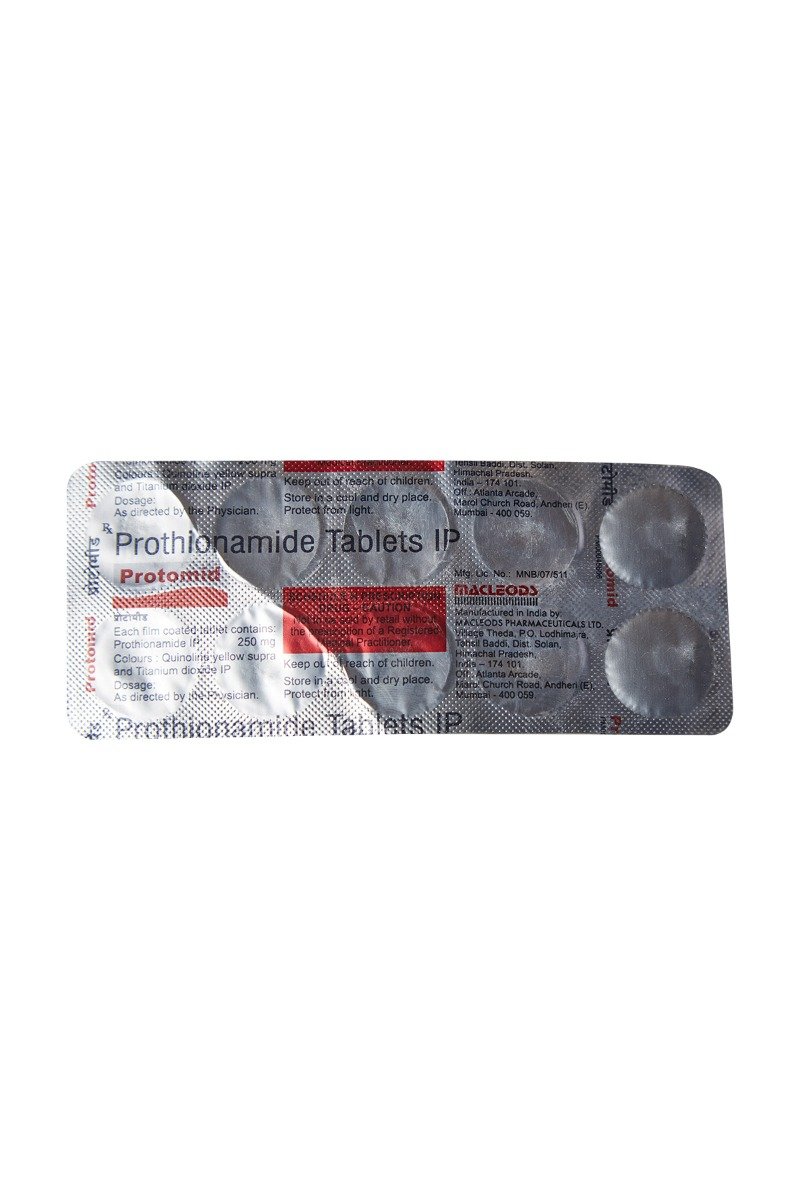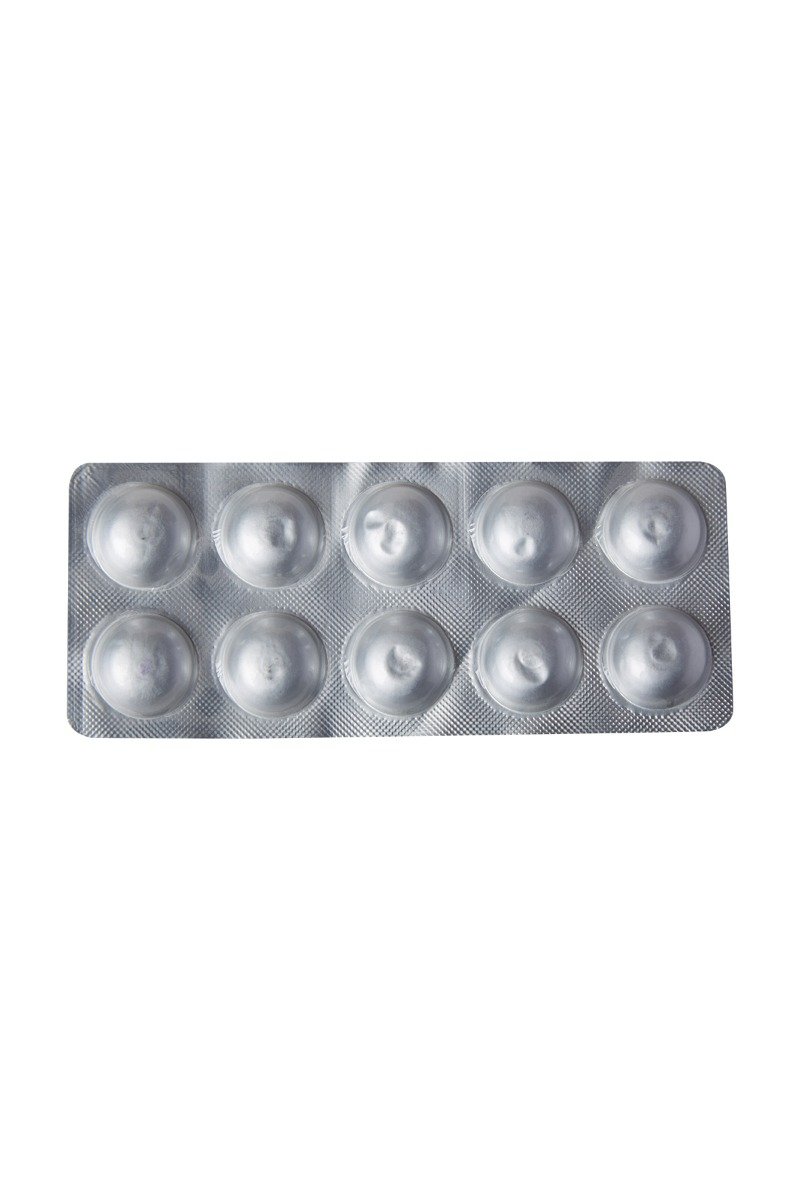Protomid Tablet 10's
MRP ₹189
(Inclusive of all Taxes)
₹28.4 Cashback (15%)
Provide Delivery Location
Online payment accepted
 Prescription drug
Prescription drugWhats That
Composition :
Manufacturer/Marketer :
Consume Type :
Expires on or after :
Return Policy :
About Protomid Tablet
Protomid Tablet belongs to a class of medications known as anti-tuberculosis (antibiotics) drugs primarily used to treat and prevent tuberculosis (TB). Tuberculosis is a bacterial infection that mainly affects the lungs and can spread to other body parts like the brain and spine.
Protomid Tablet consists of a medicine called Prothionamide. Prothionamide is clinically effective in treating TB; the precise mechanisms of action remain unknown, but a cell-based activation method causes an inhibiting complex.
Follow the dose and duration as advised by your doctor, preferably at the same time every day. Finish the full course of treatment, and do not skip any doses even if you start feeling good. Discontinuing its use on your own can result in treatment failure and the development of drug-resistant tuberculosis, leading to serious health complications. If you miss a dose, take it at the earliest. However, do not take double doses or overdose to fulfil missed doses as it may increase the side effects. Some people may experience nausea, vomiting, diarrhoea, stomach pain, increased salivation, metallic taste in the mouth, headache, dizziness, and drowsiness as side effects of this medicine. Please speak with your doctor if these side effects do not resolve or worsen. It is advised to take antacids containing aluminium at least 4 hours before or after taking Protomid Tablet to avoid drug interaction.
If you are allergic to Protomid Tablet or any other medicines. Consult your doctor before taking Protomid Tablet if you are pregnant. Avoid breastfeeding while taking Protomid Tablet as it passes into breast milk. Take Protomid Tablet with caution if you have diabetes. Protomid Tablet may rarely cause dizziness, and vision problems, so drive with caution if you experience these signs. Avoid consuming alcohol with Protomid Tablet as it might lead to liver problems or mental/mood changes. Do not take Protomid Tablet if you have severe liver disease. Inform your doctor immediately if you experience/notice confusion, seizure, dark urine, or clay-coloured stools after taking Protomid Tablet .
Uses of Protomid Tablet
Directions for Use
Key Benefits
Protomid Tablet consists of a medicine called Prothionamide. Prothionamide is clinically effective in treating TB; the precise mechanisms of action remain unknown, but a cell-based activation method causes an inhibiting complex.
Storage
- Frequent flossing and brushing can help remove bacteria and debris that can give your teeth a metallic taste.
- The metallic flavor may be caused by a zinc deficiency. Eat foods like meat, chicken, and oysters that are high in zinc.
- Reducing the intake of foods with strong aromas, like onions and garlic, as they may intensify the taste of metallic substances.
- Avoid smoking and tobacco products as they may intensify the metallic flavor.
- Inform your doctor about dry mouth symptoms. They may adjust your medication regimen or prescribe additional medications to manage symptoms.
- Drink plenty of water throughout the day to help keep your mouth moist and alleviate dry mouth symptoms.
- Chew sugar-free gum or candies to increase saliva production and keep your mouth moisturized.
- Use saliva substitutes, such as mouthwashes or sprays, only if your doctor advises them to help moisturize your mouth and alleviate dry mouth symptoms.
- Avoid consuming smoking, alcohol, spicy or acidic foods, and other irritants that may aggravate dry mouth symptoms.
- Schedule regular dental check-ups to keep track of your oral health and handle any dry mouth issues as they arise.
- Inform your doctor about the nausea and discuss possible alternatives to the medication or adjustments to the dosage.
- Divide your daily food intake into smaller, more frequent meals to reduce nausea.
- Opt for bland, easily digestible foods like crackers, toast, plain rice, bananas, and applesauce.
- Avoid certain foods that can trigger nausea, such as fatty, greasy, spicy, and smelly foods.
- Drink plenty of fluids, such as water, clear broth, or electrolyte-rich beverages like coconut water or sports drinks.
- Use ginger (tea, ale, or candies) to help relieve nausea.
- Get adequate rest and also avoid strenuous activities that can worsen nausea.
- Talk to your doctor about taking anti-nausea medication if your nausea is severe.
- Record when your nausea occurs, what triggers it, and what provides relief to help you identify patterns and manage your symptoms more effectively.
- Inform your doctor about dizziness symptoms. They may adjust your medication regimen or prescribe additional medications to manage symptoms.
- Follow your doctor's instructions for taking medication, and take it at the same time every day to minimize dizziness.
- When standing up, do so slowly and carefully to avoid sudden dizziness.
- Avoid making sudden movements, such as turning or bending quickly, which can exacerbate dizziness.
- Drink plenty of water throughout the day to stay hydrated and help alleviate dizziness symptoms.
- If you're feeling dizzy, sit or lie down and rest until the dizziness passes.
- Track when dizziness occurs and any factors that may trigger it, and share this information with your doctor to help manage symptoms.
- Hydrate your body: Drink enough water to prevent dehydration and headaches.
- Calm Your Mind: Deep breathing and meditation can help you relax and relieve stress.
- Rest and Recharge: Sleep for 7-8 hours to reduce headache triggers.
- Take rest: lie down in a quiet, dark environment.
- Cold or warm compresses can help reduce tension.
- Stay Upright: Maintain good posture to keep symptoms from getting worse.
- To treat headaches naturally, try acupuncture or massage therapy.
- Over-the-counter pain relievers include acetaminophen and ibuprofen.
- Prescription Assistance: Speak with your doctor about more substantial drug alternatives.
- Severe Headaches: Seek emergency medical assistance for sudden, severe headaches.
- Frequent Headaches: If you get reoccurring headaches, consult your doctor.
- Headaches with Symptoms: Seek medical attention if your headaches include fever, disorientation, or weakness.
Drug Warnings
Before starting Protomid Tablet , please inform your doctor if you have a medical history, especially of: liver disease, underactive thyroid (hypothyroidism), kidney disease, eye problems (such as optic neuritis, cataracts). Take Protomid Tablet with caution if you have diabetes. Protomid Tablet may lower your blood sugar levels. Also, check your blood sugar level regularly as directed by your doctor. Consult your doctor before taking Protomid Tablet if you are pregnant. This medication is not recommended for use in pregnant women. Avoid breastfeeding while taking Protomid Tablet as it passes into breast milk. Protomid Tablet may cause dizziness, and vision problems, so drive with caution. Avoid consuming alcohol along with Protomid Tablet as it might lead to liver problems or mental/mood changes.
Drug-Drug Interactions
Drug-Drug Interactions
Login/Sign Up
Drug-Food Interactions
Drug-Food Interactions
Login/Sign Up
Diet & Lifestyle Advise
- Pineapple juice might help soothe the symptoms of cough and cold. It also has anti-inflammatory and mucolytic properties.
- Foods rich in vitamin C such as kiwi, broccoli, and bell pepper, help improve the immune system.
- Avoid processed and fried foods.
- Warm ginger tea or warm soup can help in providing relief from cough.
- Avoid foods and drinks containing histamine or tyramine such as cured meat, matured cheese, soya, tuna, salmon, mackerel, wine, and beer.
- Quit smoking and avoid alcohol consumption.
Side Effects of Protomid Tablet
- Nausea
- Vomiting
- Diarrhoea
- Stomach pain
- Metallic taste in your mouth
- Headache
- Dizziness
- Drowsiness
Habit Forming
Therapeutic Class
All Substitutes & Brand Comparisons
Author Details
We provide you with authentic, trustworthy and relevant information
Drug-Diseases Interactions
Drug-Diseases Interactions
Login/Sign Up
FAQs
Protomid Tablet consists of medicine called Prothionamide. Prothionamide is clinically effective in treating TB; the precise mechanisms of action remain unknown, but a cell-based activation method causes an inhibiting complex.
No, please do not stop taking Protomid Tablet even if you feel better as it may worsen your condition. For the best advice, consult your doctor and do as recommended.
No, it is a prescribed drug given by a physician for preventing specific medical conditions. Taking it on your own can cause unwanted side effects.
Drug-Drug Interactions Checker List
- ISONIAZID
- CYCLOSERINE
- RIFAMPICIN
Special Advise
- Your doctor may advise you to get regular liver tests while taking Protomid Tablet to check how your liver functions.
- You may need frequent blood tests to check your liver and thyroid function. You may also need frequent eye exams.
- If you have diabetes, check your blood sugar levels carefully while on this medication.
Disease/Condition Glossary
Tuberculosis (TB): Tuberculosis is an infectious disease that affects the lungs, but it could also spread to other body parts such as the kidneys, brain, spine, and bone marrow. Tuberculosis is caused by a bacteria named Mycobacterium tuberculosis. It is a contagious disease that can spread to others through small droplets released into the air by a person suffering from tuberculosis. Symptoms include a cough that lasts for a few weeks, pain while coughing or with normal breathing, unexplained fatigue, fever, night sweats, loss of appetite and weight. People who smoke or consume alcohol, people diagnosed with HIV, and immune system problems are more likely at risk of developing active TB.

Have a query?
Alcohol
Safe if prescribed
Consuming alcohol along with Protomid Tablet is not advisable as it may cause unpleasant side effects.
Pregnancy
Consult your doctor
Please consult the doctor. There are no adequate and well-controlled studies on pregnant women. Your doctor will prescribe only if the benefits outweigh the risks.
Breast Feeding
Consult your doctor
Please consult the doctor. There are no adequate and well-controlled studies on pregnant women. Your doctor will prescribe only if the benefits outweigh the risks.
Driving
Safe if prescribed
Patients who experience dizziness or lightheadedness while receiving Protomid Tablet should refrain from operating machinery.
Liver
Consult your doctor
There is limited information available on the use of Protomid Tablet in patients with liver disease. Your doctor will weigh the benefits and any potential risks before prescribing them to you. Please consult your doctor.
Kidney
Consult your doctor
There is limited information available on the use of Protomid Tablet in patients with Kidney disease. Your doctor will weigh the benefits and any potential risks before prescribing them to you. Please consult your doctor.
Children
Safe if prescribed
Protomid Tablet is not recommended for children below 18 years of age.









